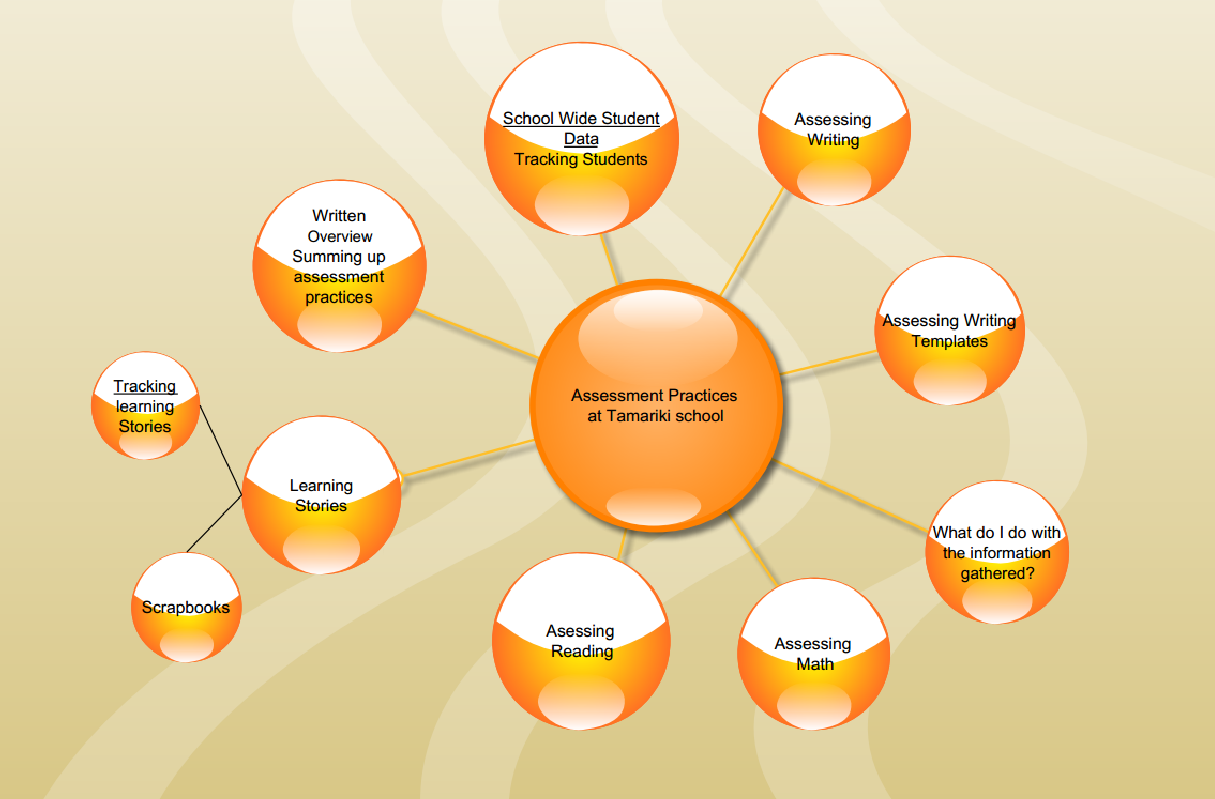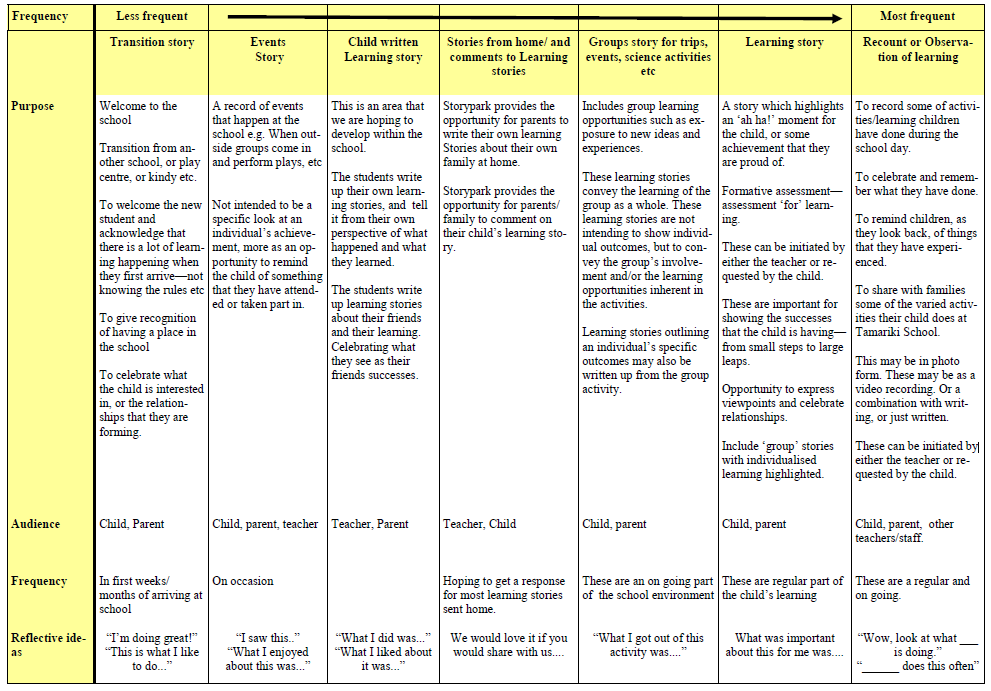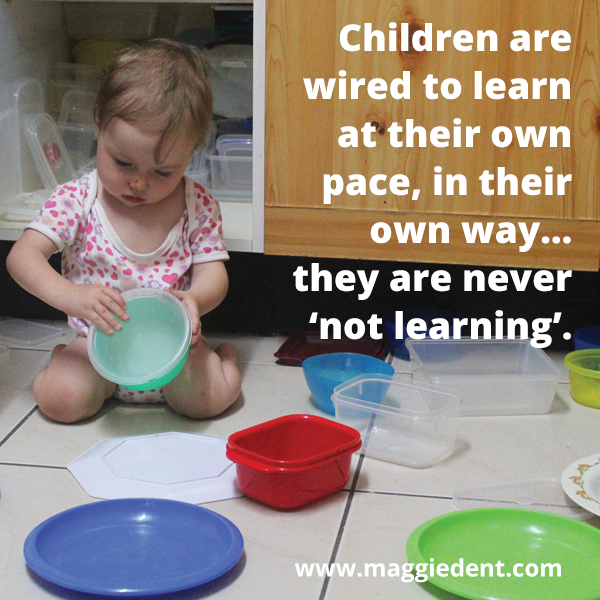Assessment and Evaluation
The Special character philosophy impacts on the ways in which assessment and evauation is practised at Tamariki School. It happens on a daily basis, and is regualr and ongoing, however it may not seem as obvious as at a regualr NZ school because we don't grade the students work.
The goals and aims of the students to self direct their learning are formost in our awareness.
All the students are tracked and the staff discuss in depth every child in the school at least twice a year, reviewing their social an emotional growth as well as their academic progress. This information is tracked and recorded.
Assessment
Three Broad Purposes of Assessment
The New Zealand Curriculum (pg 39) recognizes that the primary purpose of assessment is to improve students’ learning and teachers’ teaching. This aspect of assessment is often referred to as Formative Assessment, and is described as follows...
“Assessment for the purpose of improving student learning is best understood as an on-going process that arises out of the interaction between teaching and learning. It involves the focused and timely gathering, analysis, interpretation, and use of information that can provide evidence of student progress. Much of this evidence is ‘of the moment’. Analysis and interpretation often take place in the mind of the teacher, who then uses the insights gained to shape their actions as they continue to work with their student.” (NZ Curriculum pg 39).
At Tamariki the student is directly involved in assessing their own learning and in developing the dispositions and actions necessary for them to continue learning throughout their lives. This aspect of assessment could be referred to as Fostering Lifelong Learning.
A third purpose of assessment is to provide accountability and reporting of learning to the Board and the Ministry. i.e. Summative Assessment. This information is then available to effect changes in the delivery of the curriculum, at both the staff and Board level.

Assessment Practices at Tamariki
The emphasis of assessment is to focus on the change in the thinking and understanding of each child (their learning progress and growth). The change factor helps to identify that the child may be ready to move onto the next stage of their learning, or that they possibly need support, or perhaps, that the teacher’s practise could be altered.
The staff closely observe the students and know a lot about the students at Tamariki School. A major challenge is to record what we have observed, and record what the children know and understand – Due to the vast amount of leaning which happens daily. There is the factor of time manageably which every teacher in NZ schools has to make decisions around. It could take the best part of a day to record the learning which happens in half an hour at the school. This is because there is such a diverse range of learning happing simultaneously, particularly around the Key Competencies and the quality of learning that occurs during children’s Free Play.
Storypark has helped with some of this ‘recording of learning’. This learning is immediately shared with the child’s family, and they may choose to respond to the learning if they choose to.
There is a wide range of types of Learning Stories which the staff will record on Storypark. Each has a different purpose. Due to time management photos, and videos will be utilised to capture learning.
Types of learning stories:

Our experience shows that adults can become intrusive. This can interfere with the child’s learning, so teachers will assess whether their involvement would stop the children’s natural flow of learning, or add value.
The following assessment practices are either in place at Tamariki School:
Childrens’ self-assessment for Fostering Lifelong Learning
· Private, internal self-assessment as they go about their day at school
· Conversations with other children and adults in the community about their activities and observations
· The child’s voice included in a Learning Story
· Writing their own Child’s Voice Learning Story
· The child reflecting on what they can now do, that they could not do before, or so well
· Writing about or filming their learning
Formative Assessment—Observation based
· Note: Formative assessment is the primary, and most valued, form of assessment for Free Play
· Narrative assessment i.e. Learning Stories
· Teacher observation during meetings, Free Play, in class, or elsewhere
· Teacher knowledge of the students due to small school/class sizes and close relationships with the students
· Learning Conversations with students – regular and ongoing
· Parent’s responses and reflections i.e. Parent interviews, parent informal discussions, parent response sheets for the Learning Stories.
· Identifying ‘At Risk’ students through our Traffic Light system, that have difficulties with their social, emotional or academic growth
· Work Samples
· Overall Teacher Judgement for National Standards data collection
· Writing target group students – Staff Professional Development reflection sheets outlining decisions in planning, and teaching approaches, as well as the expected outcomes and out reflections on the learning process.
Formative Assessment—Tool based
· Note: these are only done with the consent of the child
· Running records for numeracy and literacy
· E-asTTle – data shapes future planning, and identifying gaps school wide e.g. 2017 June results indicated that our focus on structure/language features had produced gains, and now an area needing to be strengthened is vocabulary.
· Diagnostic tests e.g. Numeracy project
· Comparison to NZ Curriculum exemplars
· Numeracy assessment tool
· Numeracy interview
· Numeracy snapshots
· PM Benchmark for reading
· Prose inventory
· Analysis of the surface features of a student’s writing
· Analysis of the deeper features of a student’s writing
· Tabs in Storypark to link evidence of learning to the Key Competencies, Learning Area objectives
· PaCT - 2017 The teaching staff have PD with Brent Langhom and will be developing our knowledge and skills with using PaCT in the second half of 2017.
Summative Assessment
· Twice yearly review of every student for Reading, Writing, and Math in relation to the NZ curriculum levels. Social and Emotional development information is also recorded for the student the same time. These are completed twice a year the first is recorded in the first half of the year (term 1 or 2) and the second in the latter part of the year (terms 3 or 4) EasTTle data is also recorded here, and any other relevant data e.g. information from Mathletics, Running Records etc . This is referred to as the Traffic Light due to the student’s indicator for either academic, or social and emotional concerns or positives colour coding. If the student have moved from the White or Green areas into the orange they are at risk, and if they are in the red areas then they are identified as being at extreme risk. Refer to Tracking
· National standards for numeracy and literacy
· Narrative Assessment i.e. Learning Stories, some of these will contain summative information for the parents and students.
· School wide tracking system of children on numeracy and literacy Learning Objectives from NZ curriculum in Storypark Reports
· EasTTle reports for Literacy for students who opt to sit formal written assessment, or EasTTle reading assessments.
· PaCT - 2017 The teaching staff have PD with Brent Langhom and will be developing our knowledge and skills with using PaCT in the second half of 2017.
· Parents offered interviews twice a year
· Parents able to book an interview at any time throughout the year.
· Reports to the BOT
Tracking learning and identifying At-Risk students is outlined here

.jpg)